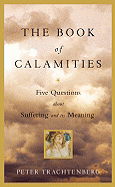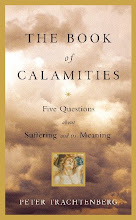

Trachtenberg sets as his task the exploration of these questions: Why did this happen to me? How do I go on? If my suffering is the result of other people's malice, what do I require in the way of justice? What does my suffering say about me and about God? If I have been spared suffering, what obligation do I have toward those who haven't? Any single question could consume an entire text, and it's to Trachtenberg's credit that he's able to give all of them ample consideration in this work.
To explore how humanity has set about crafting responses to his questions, Trachtenberg introduces a diverse array of characters, from the victims of manmade disasters of epic scale like the Rwandan genocide and devastating natural catastrophes like the Indonesian tsunami, to Kate and Kelly Daley, twins suffering from recessive dystrophic epidermolysis bullosa, a rare and horrific skin disease that eventually will claim their lives. What's most arresting is Trachtenberg's skill at juxtaposing tales of suffering that are far from obvious: the story of Andrea Yates, the Houston mother who drowned her five children, with Aeschylus's Oresteia trilogy and the struggle of the Rwandan people to mete out justice to the perpetrators of that country's genocide, to cite but one example. He demonstrates sophisticated insight into traditional religious texts, from the Gilgamesh epic to the Book of Job to the sixth century writings of the Christian martyr Boethius. Revealed in each of his stories, with great sensitivity and humanity, is not merely a catalogue of the myriad ways we cope with suffering, but the essential, if often inexplicable, resilience of the human spirit in that eternal struggle.
It would be presumptuous of any author to suggest he has presented in a single volume, even one as filled with wisdom as this one, definitive or even fully satisfying answers to a tangle of questions that have vexed great thinkers for thousands of years. Peter Trachtenberg makes no such claim, conceding that most of them are unanswerable. Humble as this attempt may be, as an example of thoughtful striving to illuminate those timeless questions it's unmatched.--Harvey Freedenberg
Shelf Talker: Recognizing that suffering is the eternal condition of humanity, this thoughtful and highly original work explores the myriad ways in which we confront that reality and endeavor to surmount it.

